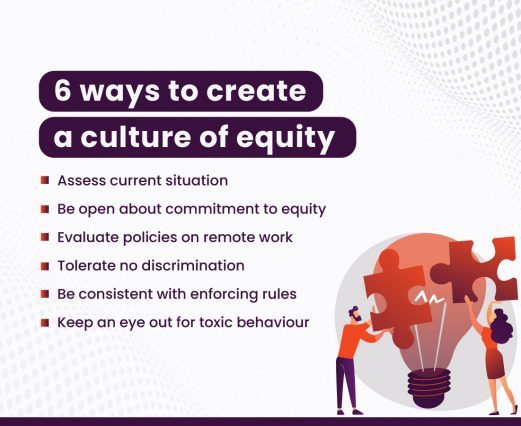
Equity is a vital cog in diversity and inclusion initiatives. Where diversity and inclusion bring variety to the workforce, equity levels the playing field in the workplace, encouraging continuous innovation, a key driver of competition and business viability.
According to a study by Accenture, employees’ innovation mindset is nearly three times higher in companies with a robust culture of equity and equality than in least-equal companies. An organisation can only truly utilise the talent in its diverse workplace and reap the business gains when it combines diversity with a culture of equity.
Does a culture of equity impact business performance?
Instilling a culture of equity requires a commitment to treat every employee fairly and create an empowering environment. This means anticipating, identifying, and addressing the discrepancies in the needs of the different demographics in the workforce. In such an environment, every employee gets the resources and support they need to flourish, improving business performance.
Here are some benefits of equity in the workplace.
It improves employee motivation
When you treat employees in a transparent, consistent, and respectful manner, they are encouraged to take ownership of their tasks. As a manager, you wouldn’t need to prod them before they do their jobs. A culture of equity encourages contribution from every quarter of the workforce because every employee feels a sense of belonging. A study by Better Up linked “belonging” to a whopping 56% increase in job performance, a 50% drop in turnover risk, and a 75% reduction in sick days.
Solutions from a 360-degree point of view
With a diverse workforce firing on all cylinders, a company gets to have solutions to problems from a 360-degree point of view. The company has new ways to tackle challenges and exposes other employees to new ideas. The whole workforce grows with the company.
Serve and track a broader client base
In today’s market, buyers are savvier than ever. They require personalised customer experience, which means companies need to build relationships with their clients to make loyal customers out of them. A confident and happy workforce is more likely to try and build relationships with customers and talk to others about the company. Better relationships with customers translate into sales, contributing to the bottom line.
Co-elevation
When there’s equity in the workplace, employees are more likely to co-elevate each other. Co-elevation is a collaborative approach where teams self-organize and solve problems through fluid partnerships. In other words, leadership becomes less about authority and more about a collective commitment to the company’s mission and objective. Nothing spurs growth in the business world more than a collectively committed workforce.

How can businesses create a culture of equity?
When an individual starts working at a new place, they enter into an agreement with their employer. They expect to be paid, respected, and empowered to do the job adequately. A culture of equity ensures that everyone is treated with dignity and respect in the workplace and that remuneration is proportional to the output. Steps to create a culture of equity includes:
Assess current situation
To begin with, managers need to assess the current standing of the company in order to create a culture of equity. Achieving this will involve learning how your employees feel about the company and how the culture can be improved. With this information, the company can have a pretty clear idea of where to start making adjustments. Hence, targets and benchmarks can be set.
Be open about commitment to equity
Being open about commitment to equity galvanizes employees and helps with accountability. However, leaders need to make sure everyone is on the same page about what equity entails. There are different interpretations of words and sentences. This can lead to different expectations from various employees.
Evaluate policies on remote work
It can sometimes feel like remote workers aren’t really part of an organisation because they don’t always show up physically in the office. As a company, you need to be flexible about remote work. Provide remote workers with the same support and resources you extend to in-office employees.
Tolerate no discrimination
Make strong policies around discrimination at every point, including during hiring, interviews, and onboarding. Not just policies, though. Also, put measures in place to check conscious and unconscious biases. Under no circumstances should anyone, at any point, be discriminated against based on their culture, sexuality, religion, race, gender, ethnicity, etc.
Be consistent with enforcing rules
One of the leading killers of team spirit is favouritism. Whatever the rules stipulate should apply to every employee equally. Team members might feel resentful to watch as the rules constantly bend to spare certain individuals. Favouritism can spur some team members into flouting certain rules and codes of conduct. After all, the rules can’t be for all if certain people face no consequences for breaking them.
Keep an eye out for toxic behaviour
It takes time and effort to instil a culture of equity. Managers need to look out for toxic employees and behaviours. When spotted, managers should handle undesirable behaviours before it spreads through the workforce. It is crucial to catch and deal with toxic behaviours early.
Furthermore, when hiring, business leaders need to look out for potential employees who fit the company’s culture. From the get-go, be as transparent as possible on the suitable candidate for the role. HR needs to make sure the candidate can work with others and are passionate about the industry in general. People make culture, so finding the right people contributes significantly to the existing culture instantly and helps sustain it.


